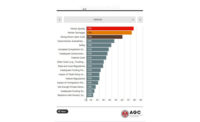Materials
US Doubles Tariffs on Canadian Softwood Lumber and Contractors Expect Higher Prices
Economists say the action will increase prices and constrain supplies

Even as mills ramp up production to meet wood demand, contractors are still having a difficult time sourcing the material for concrete framing, roofing and several other non-residential construction uses.
Photo courtesy of Getty Images
The Biden administration's US Commerce Dept. on Nov. 24 followed through with expected anti-dumping and countervailing duties on Canadian softwood lumber producers, placing tariffs of 17.99% on their imports, more than twice the rate of 8.99% during the Trump administration.
"These unjustified duties harm Canadian communities, businesses, and workers," said Mary Ng, Canada's minister of international trade, in a sharply worded statement. "They are also a tax on U.S. consumers, raising the costs of housing, renovations, and rentals at a time when housing affordability is already a significant concern for many."
In May, Commerce said it planned to hike the rate to 18.32% but the agency decided to ratchet down that plan after further study over the summer. Nevertheless, the department more than doubled the base levy on Canadian producers. While the homebuilder customers that Ng mentioned will likely be the hardest hit, contractors building commercial and other building types also expect to see higher prices due to the higher tariff rates.
"While lumber is much more important to single-family construction than multifamily, it is a significant cost element for many projects, such as remodeling projects and decks or other additions to restaurants," said Ken Simonson, chief economist for the Associated General Contractors of America. "A doubling of this tariff will only prolong the extreme price increases that have hit lumber repeatedly over the past 18 months."
However, U.S. lumber producers welcomed the stiffer penalties on what they have alleged for more than a decade was unfair competition due to government subsidies by Canada to its mills and producers.
"The U.S. Lumber Coalition strongly urges the administration to continue full trade law enforcement," said Jason Brochu, chairman of the U.S. Lumber Coalition and co-president of Pleasant River Lumber Co. "More U.S. lumber being produced in America to meet domestic demand is a direct result of the enforcement. A level playing field is critical for the continued investment and growth of the domestic lumber industry and its hundreds of thousands of workers and thousands of communities across the United States."
The British Columbia Lumber Trade Council mentioned the fragile post-pandemic recovery of lumber markets in its remarks lamenting the U.S. actions.
"As U.S. producers remain unable to meet domestic demand, these duties are a threat to post-pandemic recovery on both sides of the border," said Susan Yurkovich, president of the British Columbia Lumber Trade Council. "Our strong hope is that the U.S. industry will end this decades-long litigation and instead work with us to meet demand for the low-carbon wood products the world wants, including American families."
The fight, indeed, goes back decades and involves stumpage fees and clean energy subsidies that the Canadian government provides companies such as government-operated electricity utilities, which pass the savings along to mills in their territories.
American producers insist that such subsidies create an unfair market advantage for their northern neighbors. The Canadian producers have pointed to the 2020 period of the latest report to Congress as unfair because the rates used during that period were set when all utilities received higher subsidies due to the pandemic.



